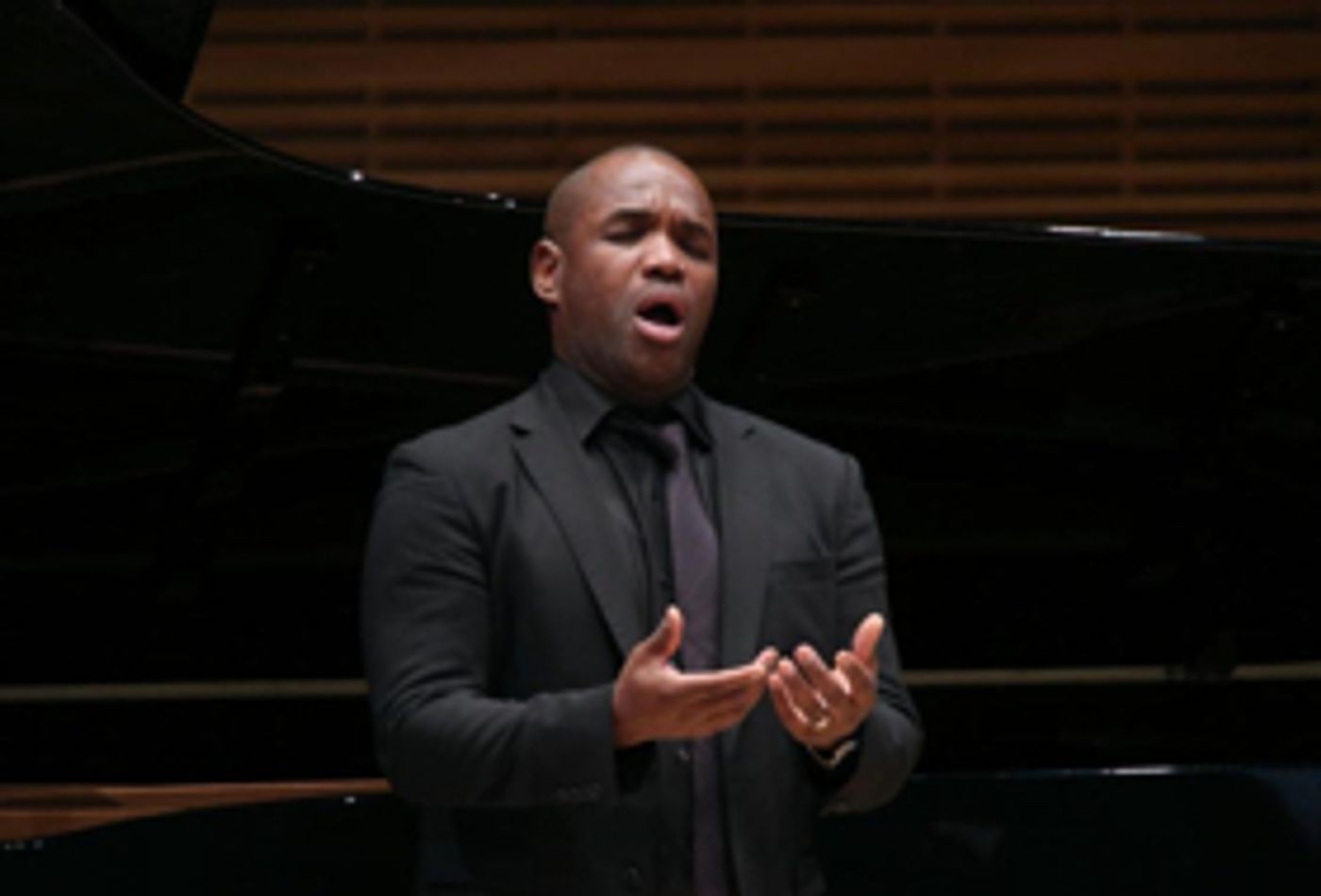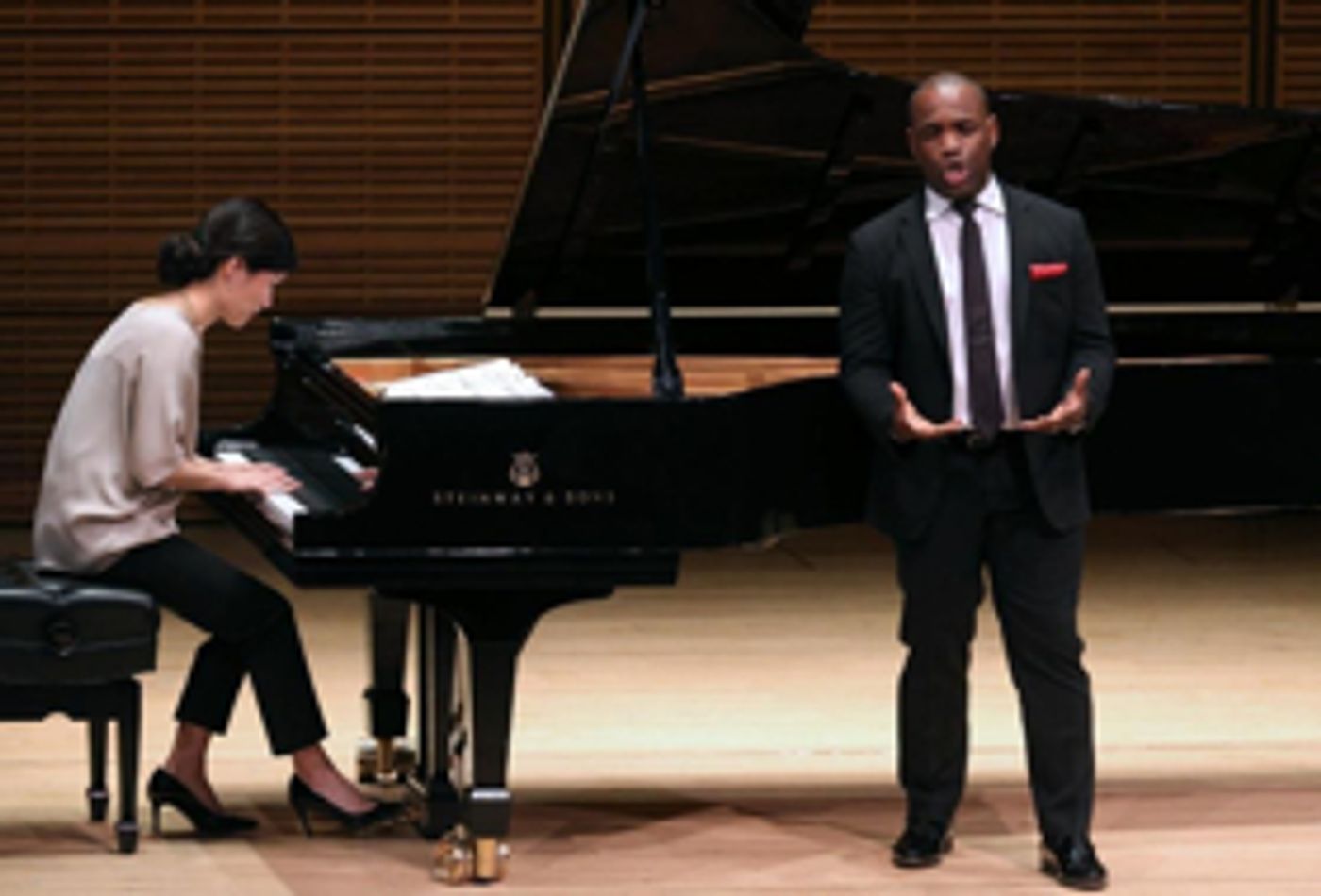Review: A Poet's Love and the CYCLES of Lawrence Brownlee at Carnegie's Zankel Hall

On the surface, the two major works on Lawrence Brownlee's recital at Carnegie's Zankel Hall last night might seem not to have much in common. The first, Robert Schumann's "Dichterliebe (A Poet's Love)," was written around 1840; "CYCLES OF MY BEING," by Tyshawn Sorey and Terrance Hayes, a couple of MacArthur geniuses, debuted in Philadelphia in February and had some subsequent changes before it arrived in Zankel on Tuesday, so it's safe to call it "brand new."
Yes, poets wrote the texts of both (although Brownlee himself contributed a substantial portion) and, yes, both talked about disappointment (though hardly the same kind). For me, their great tie, however, was how Brownlee seemed to connect so well with both.

Photo: Steve J. Sherman
Brownlee told me that he took some time for coaching the Schumann--particularly to check on his German--while in Munich doing the Italian Singer role ("about 3 minutes of Strauss," says the tenor) in DER ROSENKAVALIER. In greeting the audience at the recital, he said that he'd turned to the Schumann looking for something "grown-up" to add to his repertoire and called his current reading of "Dichterliebe," which tells of a poet's love, "the beginning of a journey" at this point. He spoke about the labors of love that tenor Fritz Wunderlich and other singers had done in getting the piece under their skin, sometimes making multiple recordings of it as they learned more about it.
The tenor, however, needed no excuses for his gorgeous renditions of the 16 songs (nor for the thoughtful collaboration of Huang), running the gamut of emotions from tender and eager to bitter and stoical in the face of hopelessness. The warmth and vibrancy of his voice fit the needs of the music exquisitely, whether calling for hushed tones (as in "Hor'ich das Liedchen klingen") in recounting a song once sung by his love, or a mix of jauntiness and sadness in "Ein Jungling liebt ein Madchen," telling of love gone awry and "the moral of the story..."
When he got to "Aus alten Marchen" near the end of the cycle, his gusto had me almost expecting him to interpolate a few high Cs, for which he's justly famed, e.g., "Ah, mes amis" from FILLE DU REGIMENT. (He didn't.) The final, rather declamatory "Die Aalten, bosen lieder (The Bad, Old Songs)" ended using the sweetest part of Brownlee's voice in singing of the sorrow of his love's loss.
And now for something completely different...
As I wrote in my interview with Brownlee last week, CYCLES is very personal to him. He told me, "The subject material is something very provocative, something close to home. We ask the questions about many things that we, as black men, face on a day-to-day basis," says the singer. "We start by saying, 'America, I see you hiss and stare. Do you love the air in me as I love the air in you?' It's our opportunity to ask the questions that have never been answered for us--to give people a look into what we face every day." (Read the rest of the interview.)
No matter how close Brownlee feels to the Schumann--and how the audience drinks in Schumann's exquisite art--I couldn't help see it as a kind of warm-up for him for the CYCLES, in which the singer absolutely commanded the stage and sounded gorgeous even in the most dissonant sections.
The piece exists in two forms: for tenor/piano duet and for singer with a crack ensemble (Kevin Miller on piano, Khari Joyner on cello, Randall Goosby on violin and Alexander Laing on clarinet fit the bill) that, at its NY premiere as well as its world premiere in Philadelphia, was conducted by the composer. (Brownlee and his "Dichteliebe" accompanist--pianist Myra Huang is really much more than that--did a slightly different version of CYCLES in Chicago.)
After a pithy introduction by the lyricist, poet Terrance Hayes, the music began, weaving a variety of styles that I heard referred to in terms as different as Britten-esque to Gershwin-ian. I couldn't help remember that Brownlee told me that Sorey's first draft of the score lay a third lower, because now it allows the drama in his voice to soar--and soar it does.
It was the jazz and percussive elements in the score, however, that drew me most--but also, in Part Three, "Hate," where Sorey left certain lines without any music at all, with the power of the words to stand on their own (e.g., "You don't know me. Still you hate me.") The ethereal tones of the ensemble played counterpoint with the text of "Hate" (originally two pieces, with some text by Brownlee), poignant yet not letting anyone get off easy: "I hate that your hate can decide my own fate."
In the first part, "Inhale, Exhale," despite the disturbing text ("I hear you hiss and stare..."), the music was melodic, beautifully written for the violin and the combination of Brownlee's bronze-like tone and Joyner on cello a potent duet. (I never realized how cello-like Brownlee's voice is.) Following it with the dissonance of the piano in Part Two, "Whirlwind," was a surprise, but one I was taken with.
In "Hope," the music--sometimes agitated and increasingly so, and Laing's wailing clarinet paired with Miller's piano --kept things going even when the style of the text seemed to go on too long. Finally, Part Five, "Each Day I Rise, I Know", uses the call-and-response style--derived from West African traditions--with the men of the ensemble echoing phrases from Brownlee, with, again, the wailing clarinet and a melodic back and forth between the cello and piano, ending on a note of hope.
As noted previously, Brownlee calls the cycle personal for him and his collaborators as black men, and is not a political statement: that it is the creators' attempt to "take hold of the conversation" about the Black Lives Matter movement and not have it be sidetracked and robbed of its focus. Still, when it was finished, the tenor chose to end the concert on an upbeat, romantic note with Hoagy Carmichael's "The Nearness of You." While it was a kind of full circle to the romanticism of the Schumann, it was the CYCLES that stayed with me.
CYCLES OF MY BEING was co-commissioned by Opera Philadelphia, Lyric Opera of Chicago's Lyric Unlimited and as part of Carnegie Hall's "125 Commissions Project."
Reader Reviews
Videos

